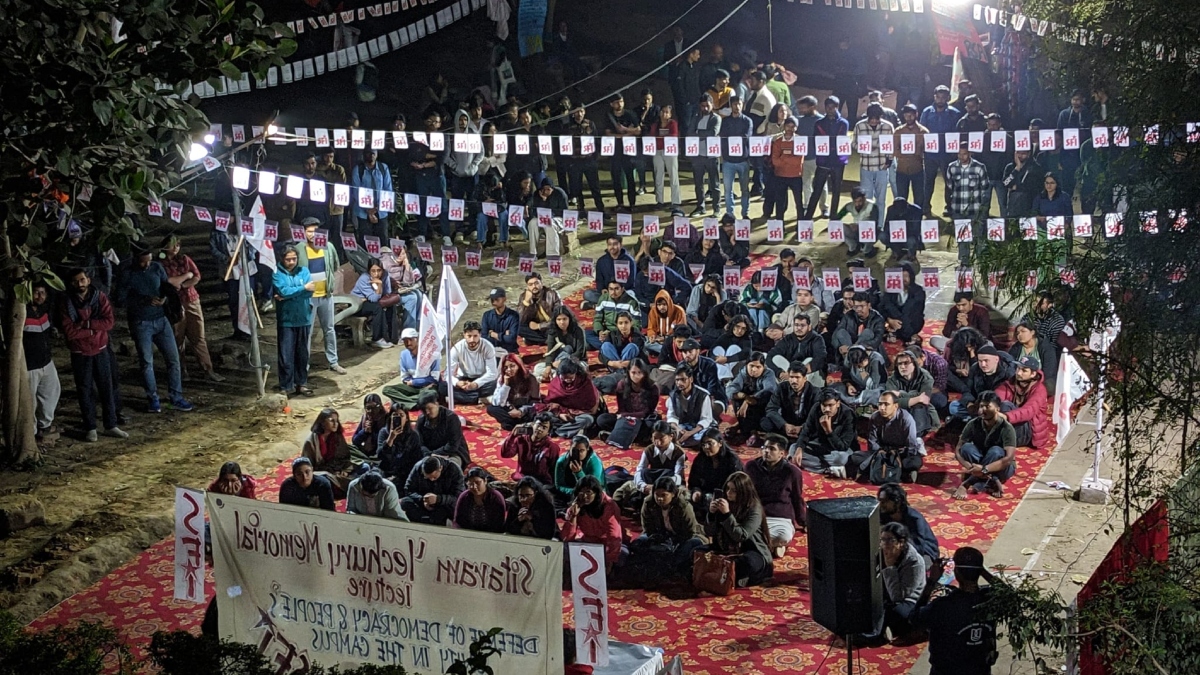JNU student elections get postponed indefinitely, intensifying the blame game
 Image of a SFI-led gathering at the JNU campus used for representationThe student politics of Jawaharlal Nehru University (JNU), known for its heated debates and strong tradition of activism, has once again found itself mired in controversy. The Jawaharlal Nehru University Students’ Union (JNSU) election has been postponed indefinitely following two days of alleged violence and vandalism in the election committee office, marking an unprecedented pause in one of India's most politically active campuses. The violence happened over multiple extensions of the deadline for withdrawal of nominations.
Image of a SFI-led gathering at the JNU campus used for representationThe student politics of Jawaharlal Nehru University (JNU), known for its heated debates and strong tradition of activism, has once again found itself mired in controversy. The Jawaharlal Nehru University Students’ Union (JNSU) election has been postponed indefinitely following two days of alleged violence and vandalism in the election committee office, marking an unprecedented pause in one of India's most politically active campuses. The violence happened over multiple extensions of the deadline for withdrawal of nominations.
In a notice circulated by the EC, they cited the events of April 17 and 18 and said, “In light of major lapse of security and the environment of hostility, fear, and insecurity following the violence, it has been decided to put the entire election process on hold.”
The final list of candidates that was supposed to be released on April 15 by the EC has been delayed as well, and they said, “The election committee will resume the election process only after the safety of the EC members is ensured from the administration as well as the student organisation”. The EC has also demanded strict actions against the perpetrator of the violence and vandalism.
The incident has deepened the ideological fault lines on campus, with both Left-affiliated groups and the Akhil Bharatiya Vidyarthi Parishad (ABVP) levelling serious allegations against each other.
Left-backed student organisations have strongly condemned what they call “hooliganism politics” by the ABVP. In their statement, they accused ABVP members of attempting to forcibly enter the EC office, breaking glass panes, intimidating security guards, and even holding EC members hostage. “This is not agitation — it is an outright attack on democracy,” the statement read, adding that the EC, being an autonomous and elected student body, cannot be pressured through threats and violence. The Left groups demanded immediate action and the protection of the EC to ensure free and fair elections.
In response, the ABVP rejected these allegations and instead accused the EC of being compromised by Left-leaning organisations. They alleged that the committee, under pressure from a “Naxalite-aligned group,” extended the nomination withdrawal deadline beyond April 17 in an “unprecedented and irregular” manner. According to their statement, this extension allowed certain candidates to switch positions strategically, raising serious questions about the transparency of the election process. The ABVP has demanded the resignation of the Chief Election Commissioner and an inquiry into what they called a “fraudulent manipulation of the electoral process.”
Though the final list of candidates is not out, the alliance is already underway. This time, unlike the past years, only AISA and DSF will be forming the left alliance, whereas AISF and SFI are joining BASPA. This election was already supposed to be a close fight, and fragmentation in the left front can lead to some major changes in JNU’s campus politics. As per the campus students and party members, the elections will take place by the end of April, as semester exams are scheduled from May, making the further delay of JNSU impossible.
India